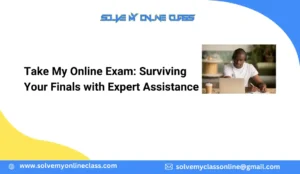Online learning has grown in popularity because it gives students all over the world flexibility and convenience. Scams that prey on students looking for help with their coursework have also increased as a result of the spike in online learning. Con artists prey on students who want to “pay someone to take my online class” or “pay someone to take my test,” providing services that frequently lead to loss of money and negative effects on their grades. Here are some vital pointers to assist you steer clear of online class frauds as you securely traverse this terrain.
1. Do extensive research:
Do extensive study before using any business that claims to “take my online course for me” or “pay to take online class.” Check for endorsements, reviews, and any warning signs. Reputable businesses will have a strong internet presence and testimonials from actual customers.
Important Points:
- Examine evaluations: Don’t limit your search to the service’s website; also look for evaluations on other websites.
- Check the Testimonials Watch out for testimonials that appear too good to be true.
- Request Suggestions: Find out from friends or peers about their experiences using comparable services.
2. Confirm Qualifications:
When you come across a service that says, “I need someone to take my online class,” make sure the people doing the work are qualified. Reputable services will hire specialists with the necessary training and experience.
Important Points:
- Verify the Requirements: Make sure the service offers details regarding the credentials of its employees.
- Ask for Proof: Never be afraid to ask for documentation of your training or prior experience.
3. Avoid Upfront Payments:
Getting paid up front before any services are provided is a typical fraud. One should be suspicious of a service if they want full payment in advance.
Principal Aspects:
- Milestone payments or partial payments are frequently accepted by reputable services.
- Methods of Secure Payment: When making payments, choose traceable and safe options like PayPal or credit cards.
4. Communicate Clearly:
When you choose to “pay someone to take my online course” or “do my online math class,” it’s important to communicate clearly. Make sure the person in charge of your class can reach you directly.
Important Points:
- Direct Communication: Make sure you have direct communication with the student enrolled in your course.
- Unambiguous Terms: Clear terms, including due dates, grades, and assigned work, should be discussed and agreed upon.
5. Watch for Unrealistic Promises:
Services that provide outlandish guarantees of grades or completion dates that appear too good to be true should be avoided.
Important Points:
- Reasonable anticipations: Recognize that no reliable provider can promise a particular grade.
- Timeline Awareness: Steer clear of guarantees that ask you to finish your schoolwork in an excessively short amount of time.
6. Check for Plagiarism Policies:
Academic penalties for plagiarism might be severe. Verify the stringent anti-plagiarism policies of any service you are considering.
Important Points:
- Verify if the service offers an original work guarantee.
- Plagiarism Reports: To confirm originality, request plagiarism reports.
7. Legal and Ethical Considerations:
Requesting that someone “take my online exam” or “pay someone to take my test” may have moral and legal ramifications. Recognize the dangers and weigh in on the possible outcomes.
Important Points:
- Academic Integrity: Keep in mind that making use of these services may be against the rules for academic integrity at your university.
- Legal Risks: Recognize that fraud and misrepresentation have legal ramifications.
8. Use Trusted Platforms:
Several trustworthy websites provide academic support and tutoring in a morally and legally compliant manner. Think about these choices rather than dangerous services.
Important Points:
- Tutoring Services: Rather than having someone else take your classes, consider using reputable tutoring services to assist with material comprehension.
- Academic Support: Ask your university for academic support; they frequently have tools available for students who are having difficulty.
9. Examine the fine print:
A service’s terms and conditions should always be read before using it. Important information regarding the policies of the service and your rights can frequently be found in the fine print.
Important Points:
- conditions of Service: Read the conditions carefully, paying particular attention to the sections on guarantees and refunds.
- User Agreement: Verify that you understand the terms of this agreement and the responsibilities of the service.
10. Trust Your Instincts:
Trust your gut if something about a service seems odd. Being careful is preferable to falling into a scam.
Important Points:
- Ill Sensation: A service is usually too good to be true if it seems too good.
- First, exercise prudence. If in doubt, look for other strategies to organize your schoolwork.
Conclusion:
Being aware of what to look out for, being vigilant, and conducting research are all necessary to prevent online class scams. Although it may seem convenient to “pay someone to take my online class” or “take my online exam for me,” the hazards frequently outweigh the advantages. Give priority to reputable academic assistance, and utilize the advice given to avoid falling victim to fraud. Recall that it is important to protect your future and academic integrity.






